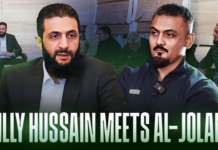5Pillars editor Roshan Muhammed Salih spoke with American Muslim writer and lecturer Daniel Haqiqatjou about Islam in America. Haqiqatjou warned that Islam is under attack by Islamophobes but is also being undermined by mainstream Muslim organisations.
Roshan Muhammed Salih: You believe that orthodox Islam is under threat in America. Why?
Daniel Haqiqatjou: Yes, Islam is definitely under attack from different quarters. There are non-Muslim Islamophobes who tend to be Conservatives, but there are also some liberals such as Bill Maher and Sam Harris for example. These are people who are supposed to be on the political Left but they regularly target Islam and Muslims.

But unfortunately there are also a lot of Muslims who fall into this second camp (the liberals) and they have gained a lot of popularity. They say they are defending Muslims against the more obvious, overt attack by the Conservatives but a lot of the political content of the Left is also anti-Islam. And ignorance or naivety about this reality is very dangerous. I think you should be more concerned about the enemy that you don’t see than the one that is more obvious.
For instance, there is this activist called Linda Sarsour who is very popular amongst the average Muslim as well as amongst the national Muslim institutions. At least several times a month she is featured by some of these institutions for a fundraising event or a conference or a convention. And she also has direct endorsements from a number of scholars and this is despite the fact that she has gone on record with many statements that are fundamentally anti-Islamic. Yet she presents herself as if she is an orthodox mainstream Muslimah and this is very problematic. I don’t want to pick on Linda Sarsour in particular but she is seen as a role model and this is problematic in my view.
RMS: Do you think that if we were not so vocal about some of our views, such as Islam’s prohibition on homosexuality, that we would be better placed to form alliances with left-wing groups which could be useful in the overall fight against Islamophobia?
DH: What is the point of fighting Islamophobia if you’re distorting Islam and especially if you’re distorting Islam in the eyes of the next generation? What sort of Islam will be left if we do that? I hear this argument all the time: let’s not be so vocal about same-sex marriage or LGBT issues. We know that there are lots of bad things that Muslims and non-Muslims do in society so why are we focusing on things like LGBT and being so vocal about it?
Subscribe to our newsletter and stay updated on the latest news and updates from around the Muslim world!

But these arguments are nonsense for a number of reasons. Yes, as Muslims we should not support all the other Fahisha (lewdness), things like gambling or the consumption of alcohol or drug use. In the US there is a huge drug epidermic; it’s wiping out entire suburbs and we shouldn’t be any less vocal on these issues and only raise the flag when it comes to LGBT. We should be consistent across the board.
But what makes LGBT a more pressing issue is that this is what is being debated now in society, so where is the Muslim voice? Are we going to be absent and not have a view on this issue? Are we not going to teach our children in the masjids about Islam’s position on homosexuality? In Canada they’re trying to make it illegal to say that engaging in homosexuality is sinful or wrong. So no matter how quiet you are on this issue, that’s not enough because now they’re trying to dictate what you can and cannot say about it in the masaajid.
RMS: There seem to be some fundamental differences between British and American Muslims. American Muslims are more affluent, more liberal and more patriotic. American Muslims have also watered down their religion to a certain extent. Would this be a fair reflection?
DH: Yes I agree with that. I can’t make a direct comparison with the UK because I haven’t been to the UK. But in the United States there is a high premium placed on the notion of being a “Muslim American” or “American Islam.” And these are concepts that are promoted in mainstream gatherings and in mainstream discourse.

As far as I can tell this is not something that is happening in the UK; there are people out there who are promoting “British Islam,” but they’re on the fringes, they’re not in the mainstream. But here in the US you have keynote speakers at mainstream conventions with thousands of people attending and they will say “yes, I am an unapologetic Muslim” and then they will say “we love this country.”
And then you have somebody like Khizr Khan who is the father of the soldier Humayun Khan who died in the Iraq war. He will be a star speaker at these conventions and he is being promoted like this is what it means to be an American Muslim – a proud father who sends his son to fight in an American war and the contradictions of that are not even apparent. And Muslims have become accustomed to dealing in this kind of politics reflexively.
RMS: Don’t you think it’s hyperbolic to talk about the possible extinction of Islam in the United States if you go down this route of appeasement?
DH: No, I don’t think it’s hyperbolic to be concerned about the future of Islam in this country. I think the statistic is that a quarter of Muslims born in America with Muslim parentage end up leaving Islam. So we have 25% who are dropping off and when we go to the masjid we are not seeing youths who are active in the masjid.
But there is a lot of immigration which is filling up the masjid so our community is not aware of this demographic downfall. So when you go for prayers on Friday you have a parking problem and the masjid is full and because of that people say we’re doing great and our numbers are better than ever.
But the reality is that the problem is masked by immigration and if the immigration was cut off completely then we would have to ask ourselves can the community regenerate itself? Well if we’re losing 25% every generation that means extinction in three generations. And leaving aside people who are leaving Islam, there is the distortion of Islam that is happening and we are not teaching or children authentic Islam. So what kind of Islam is the next generation going to be practising? Is it going to be the kind of Islam where homosexuality is okay? Where the hijab is about choice and your personal preference? Where a female can lead daily prayers in the masjid because it seems “sexist” that only a man can lead prayers?
So if that’s the kind of Islam that we’re okay with, then yes that kind of Islam can exist in the next few generations. But I don’t think that’s a success.
Daniel Haqiqatjou was born in Houston, Texas and comes from a liberal secular Muslim background. He studied physics as an undergraduate at Harvard University and completed graduate studies in philosophy, studying with some of the top physicists and philosophers in the world, including multiple Nobel Prize winners. He has also studied Islam traditionally with respected ulama. He has written and lectured on contemporary issues surrounding Muslims and Modernity over the past ten years, and has spoken at universities and mosques around the world. His work has been featured in outlets such as The Washington Post, The Atlantic, CNN, Aljazeera, Public Discourse, Mashable, and First Things. He lives with his wife and four children in the US. You can read his personal blog here.










![The Taliban’s Road To Success [Short Film]](https://5pillarsuk.com/wp-content/uploads/2024/11/Kabul-roadworks-thumbnail-218x150.png)









